Forget Ukip - euroscepticism in France would give Farage a run for his money
The UK may see itself as the traditional voice of scepticism in Europe, but with the rise of Marine Le Pen's Front National France's view of the union is far from favourable
Why Greeks voted against the gods of Europe
Why Greeks voted against the gods of Europe
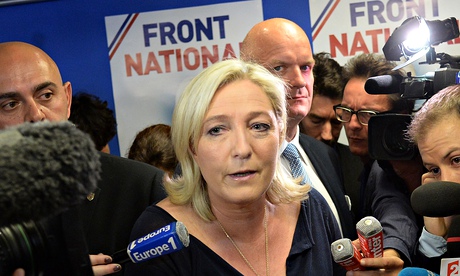
Marine Le Pen has been boosted by the ineptitude of France's main parties. Photograph: Pierre Andrieu/AFP/Getty Images
Britain, the arch-Eurosceptic member of the Union? Think again. France is now more committed to loathing the European Union than Perfidious Albion: it has indeed become the new stronghold of Euroscepticism. Last week, the EU election results were like none other before. For the first time since the end of the second world war, an extreme rightwing party topped a national poll.
Do not be fooled by Marine Le Pen's down-to-earth demeanour. She may dispense with her father's antisemitic puns or Islamophobic tirades, but under her leadership the Front National remains an extreme rightwing party; the party which was launched by Marshall Pétain's apologists and French Algeria supporters in 1972.
How could France, one of the six founding members of the EEC and traditionally a proud architect of European integration, end up with such a state of affairs? On election night the already beleaguered prime minister Manuel Valls described the results as an "earthquake". Yet the FN's victory was anything but a surprise.
Opinion polls had long registered that the public have an increasingly negative perception of the EU. A Pew Research Center survey carried out in May 2013 showed that more and more French voters believed that "membership of the EU is a bad thing". Only 41% had a "good opinion" of the EU, as against 43% in Britain. (In 2012, 60% of French viewed the EU favourably.) The question of further economic integration turns out to be the most contentious issue: only 22% French people support it, compared with 36% in 2012.
France's Euroscepticism ought to be qualified as it differs from the British brand. Bar the FN and Debout la République (a neo-Gaullist micro-party), there are no self-professed Eurosceptic parties in the French political landscape. From the radical left (Left Front) to the conservative UMP, all main parties are officially dedicated to European integration. On the far left, in the Parti Socialiste, in the Green Party and on the conservative right, some still support a federal Europe. The mainstream media and business also pay lip service to the European cause.
British Euroscepticism has traditionally been of a "hard' type. It implies a fundamental opposition to the idea of political and economic integration and expresses itself as a principled objection to the current form of integration in the EU on the grounds that it offends deeply held values, such as national sovereignty. In contrast, "soft" Euroscepticism involves contingent or qualified opposition to European integration and may express itself in terms of opposition to specific policies or in terms of the defence of the national interest.
However radical its public expression may be today, French Euroscepticism belongs to the "soft" category. It is not a principled opposition to the EU or the pursuit of integration, but it is essentially an objection to the nature of policies being implemented by EU institutions. It is also a protest against the decision-making process in the communitarian bodies. In principle, the FN does not object to France being a member of the EU and it does not advocate leaving the Union altogether either.
The French are feeling increasingly disillusioned when it comes to the EU because they regard it as promoting an aggressive brand of free-market economics. Far from protecting them from economic competition and social dumping – a race to the bottom in which employers reduce wages and employees' benefits in order to attract and retain investment – the EU is seen as an entity that undermines the French concept of what should be a European "good life". This concept is associated with solidarity, economic equality and a pro-active welfare state. What is more, the EU has dramatically failed to deliver on jobs and economic growth. France has currently 5.9 million unemployed, taking into account all categories, and 10 million people live on less than €900 per month. Rightly or wrongly, the public believe that the EU is as responsible as the French government for downgrading their living conditions.
In the 1980s and 1990s, François Mitterrand and Jacques Delors had tirelessly promoted the cause of a "social Europe". Mitterrand had urged the public to back a more "market-friendly" Europe, promising that France's partners would in turn concede elements of political and social integration to create a Europe of the people. Voters obliged, although reluctantly – the Maastricht Treaty was only approved by a narrow majority of votes in 1992. At the time, the seeds of discontent were starting to take root.
The referendum on the European Constitutional Treaty in 2005 was a turning point. After a passionate public campaign which had politicised large sections of the population, the French rejected the constitution by a resounding majority. One clause in the treaty concentrated the French resistance to it: the promotion of "free and unfettered competition" between member states. This proposition was seen in France as the prelude to ever more social dumping. The result was exceptional given that the whole French establishment had called for a yes vote. Two years later, heads of governments ratified the Lisbon Treaty, a repackaged version of the constitution. This time, the people were not consulted. Nicolas Sarkozy candidly acknowledged he could not let the French vote the "wrong way" again.
The 2014 European campaign in France was nothing like the British one. The FN, the most Eurosceptic party, hardly campaigned on immigration. It instead focused on the question of the euro. Opposition to the euro offered Le Pen an important element of demarcation since no other major party was officially against it. This stand allowed the FN to come across as more radical than the UMP, the Parti Socialiste and the establishment. She was also able to capture the mood of the nation far better than her rivals as support for FRexit [France exiting the Euro] is now gaining momentum.
The Transatlantic Trade and Investment Partnership was also debated during the French campaign. According to its critics, the purpose of Tafta [Transatlantic Free Trade Area] is to remove the regulatory differences between the US and EU member states. The agreement would grant big business the power to sue governments which try to defend their citizens. It would allow secretive panels of lawyers to overrule the will of national parliaments and annihilate governments' legal protections. The FN singled out Tafta, describing it as an "ultraliberal, anti-democratic, anti-economic and antisocial war machine".
A recent Ifop poll shows that a growing minority of French people see the euro as an obstacle to prosperity and even to peace in Europe. The idea that France should abandon the euro so as to resolve its current economic crisis has been gaining momentum over the past year. Mainstream economists are adopting an anti-euro stand. Critics argue that the euro was supposed to create a space of protection against globalisation. But by preventing devaluation, the single currency has resulted in a maximised zone of economic confrontation between member states. Thus leaving the euro would mean a return to peace. The euro was presented to the people as an economic panacea, but it has in fact accentuated disparities between member states and ruined southern Europe while securing the exports of northern member states, notably Germany.
François Hollande is accused on the left of having chosen to safeguard the currency and of sacrificing sectors of the French industry, making thousands of workers redundant. Some fear that a debate on the euro would strengthen the FN and encourage further demands for a return to national sovereignty, a theme which is increasingly popular across various categories of voters. Aurélien Bernier, a leftwing author, argues that Le Pen's success is partly due to the fact that there is no actual challenge to the euro from the left.
Her victory can be explained by several factors: the rightwing neo-liberal policies of Hollande, the inability of the Left Front to offer a plausible alternative to Hollande's policies and the cases of corruption involving several UMP leaders. Ordinary people, the "left behind" of the economic recession, want, therefore, to protest and inflict the maximum damage to establishment parties by voting for the FN. Alexis Tsipras, the leader of leftwing party Syriza, has recently declared: "Austerity has led to the creation of political monstrosities such as Nigel Farage's Ukip." There is no doubt that Marine Le Pen's Front National and French Euroscepticism prosper on the political cynicism and ineptitude of President Hollande and of mainstream parties.
Philippe Marlière is Professor of French and European Politics, University College, London
Buoyant Le Pen seeks more allies for Eurosceptic group in Brussels
Front National leader partners with Italian, Dutch, Austrian and Belgian parties and says she is confident of adding others
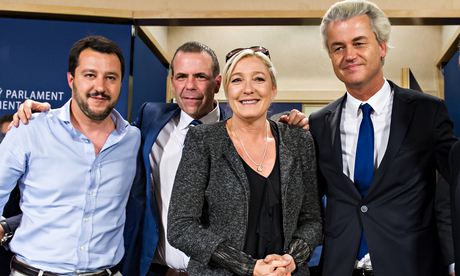
Marine Le Pen with Matteo Salvini of Italy's Northern League (left), Harald Vilimsky of Austria's Freedom party, and Geert Wilders of the Dutch Freedom party (right) in Brussels. Photograph: Geert Vanden Wijngaert/AP
Marine Le Pen is confident of forming a powerful Eurosceptic bloc before the first meeting of the European parliament at the beginning of July.
The Front National (FN) president appeared buoyed up and determined as she led a press conference with the leaders of four other far right parties in Brussels on Wednesday afternoon. And she had a message for Ukip's Nigel Farage, a rival in the pursuit of rightwing allies. "I'm sorry Nigel, we're going to form our own group," she said with a triumphant smile.
"We have just come out of a meeting and I can tell you absolutely no worries about the existence or the future of our group that, as you know, must be constituted by the first [parliamentary] session at the start of July," Le Pen said. "The existence of our group will be proof that a futureEurope of sovereign [states] that are respectful and fraternal can exist and must exist while the Europe of technocrats and totalitarianism has had its day."
Ukip is fishing in the same political pool for alliances in its own attempt to constitute an official parliamentary group. Farage, whose previous allies could defect to Le Pen, has said he will not ally himself with the FN, claiming the French party is still riven with "antisemitism and general prejudice". His remarks sparked accusations of slander from Le Pen.
Judging by her smiles, being in Brussels – home of the institution she blames for torpedoing France's economy, impinging on its sovereignty and flooding it with immigrants – does not disagree with Le Pen. The clearly delighted FN leader fired the first salvo against Farage flanked by the presidents of the Northern League in Italy, which has five European seats, the Freedom party in the Netherlands, led by Geert Wilders, which has four seats, the Freedom party in Austria, with four seats, and its traditional ally Vlaams Belang in Belgium, which has one seat.
"You know the FN that I have the honour to represent won an historic score of 25% of votes, arriving first in 71 departments and 24,400 communes out of the 36,000 in France, allowing us to quadruple our score of 2009 and multiply by eight the number of our MEPs," she said.
"We have shown a wonderful unity of the movement and maturity of the new generation of politics that we represent. The press, the system, our adversary sought to divide us, to create splits. We have shown an united front. The great lesson of this day and our presence is this unity, the same unity that allowed us this immense victory."
Despite the bravado, however, Le Pen is still short of representatives from two more countries to form a parliamentary group. Under European rules, such a group must contain at least 25 MEPs from seven different member states. The parliamentary groups must be formed before 24 June if their members wish to obtain influential posts.
The Swedish Democrats, who have worked with the FN in the past, seem hesitant to ally themselves with the French far right, while the Danish People's party, with four seats, and the True Finns party, with two, have both refused to join Le Pen's group.
Le Pen has said she does not want to join forces with Golden Dawn in Greece (three seats), Jobbik in Hungary (three seats), or the neo-Nazi Udo Pastors of the National Democrat party in Germany (one seat). It is not known whether Poland's New Right Congress (four seats) or the Lithuanian Justice Order (two seats) have been approached by Le Pen.
French analysts said Le Pen was walking a thin line of trying to form a strong Eurosceptic bloc without joining forces with openly neo-Nazi groups.
Le Pen knows she can count on the support of Matteo Salvini, leader of Italy's rightwing, xenophobic Northern League, who is one of the French politician's most vocal supporters in Europe. Salvini's Twitter profile features a picture of him and Le Pen with the slogan: "Vote for her too."
After their meeting in Brussels on Wednesday, he posted another photograph on Facebook showing the pair smiling together at a round table. "Another Europe is possible!" he wrote. "Less immigration and finance; more work and hope."
Beppe Grillo, figurehead of the Italian anti-establishment Five Star Movement (M5S), was on a more covert mission to meet Farage on Wednesday, as the M5S ponders how best to use its 17 new MEPs.
In the runup to the election, Grillo made clear that he would not join any form of alliance with Le Pen, but made no secret of his liking for Farage and some of Ukip's ideas. However, no decision was expected imminently after the meeting in Brussels, a spokesman in Rome told the Guardian.
The encounter was described as a chance for the two parties to "look for points in common" and "evaluate the idea" of a possible alliance. On his return to Italy, asked whether he had come to an agreement with Farage, Grillo said: "At the moment these are just probes. We are exploring."
Some in the M5S expressed doubt about the viability of such a step. Giuseppe Brescia, a Grillino MP in the national parliament, was quoted by the Corriere della Sera newspaper as saying: "Everyone is writing that Farage's is a xenophobic party. Ours is not."
Duncan McDonnell, a political scientist at the European University Institute in Florence, said he thought it was unlikely the M5S would form an alliance with Ukip, "especially if they put it to an online vote". Many of the M5S's moves are dictated by the verdict of an online network of activists and supporters.
As Le Pen spoke on Wednesday, hundreds of demonstrators held an impromptu demonstration against her outside the European parliament. Willy Decourty, the burgermeister of the Belgian capital, said no permission for the protest had been sought, but it would be "tolerated".
"Being a democrat, I can understand what has driven the organisers to suddenly mobilise for this kind of event," he said.
Front National's success not surprising to heartland supporters
The 'bleu Marine' wave that washed over France, giving FN one quarter of the vote, spared only Paris and the west of France
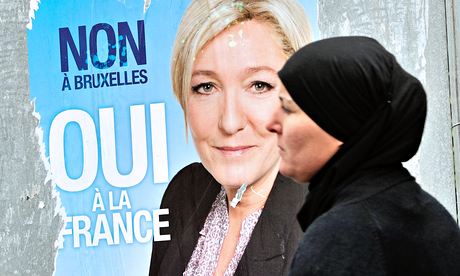
A woman walks past a campaign poster of French far-right Front National president Marine Le Pen in Denain, northern France. Photograph: Philippe Huguen/AFP/Getty Images
In the Calvados town of Lisieux in Basse Normandie (Lower Normandy) it is hard to escape the beady eye of Saint Thérèse whose imposing basilica dominates the skyline attracting thousands of pilgrims from around the world.
On Monday, however, Lisieux was paying tribute to a secular heroine whose blue-eyed stare was equally hard to avoid. From the campaign posters, newspapers and magazines ranged in the station kiosks and newsagents, the smiling – now triumphant – face of Marine Le Pen was everywhere.
"A full-frontal shock" declared the local newspaper, alluding to Le Pen's election victory in her European constituency in north-west France. "Le Pen at 25%: the shock", headlined the best-selling regional newspaper Ouest-France.
It was the first time the Front National (FN) had overtaken all the traditional parties in a national vote, coming top with a quarter of the ballots. The centre-right opposition UMP won 20%, and the ruling Socialists were in third place with 14%.
Although the opinion polls had been predicting that Le Pen's far-right Front National party could win by this much, the scale of the victory still came as a bombshell to the French press and political class. In Lisieux the FN did not even field a candidate in the 2009 European elections, when the "extreme right" candidate polled just over 2%. This time round the FN scored 27.5%.
"I don't know why everyone is so surprised; they've been telling us for weeks the FN would win," said Lisieux resident Anne.
"Yes I voted FN. Like a lot of people I'm fed up with the other parties and I think they have some good ideas," said the retired administrator, lowering her voice.
A self-employed businessman agreed. "I didn't vote FN because I didn't vote, but I can understand why people did," he said.
Like many FN sympathisers, both cited immigration, crime, delinquency and the vague and undefined sense that France is going to the dogs as concerns that had boosted support for the far right.
And like many FN sympathisers both refused to give their full names. Le Pen may claim she has "de-demonised" the party and her victory in Sunday's European ballot shows that in the secrecy of the polling booth she is right, but FN voters remain reluctant to publicly stand up and be counted.
"I won't tell my daughter I voted FN," Anne added. "She's a Parisienne, she wouldn't understand." The "bleu Marine" wave that washed over France, giving the FN one quarter of the vote, spared only the French capital and the west of France.
"But Paris is not France and France is not Paris," added the businessman, echoing the oft-repeated complaint from the provinces.
From the country's northern border with Belgium and the Channel ports of Calais and Boulogne, down through France's depressed former industrial heartlands, past the Normandy beaches, scene of the Allied D-Day landings 70 years ago next week, the voters shunned the advice from their Paris-based leaders and turned the political landscape navy blue. As the final scores came in the FN had tripled its 2009 vote in the region.
In Paris the prime minister, Manuel Valls, ruled out any policy change as the mainstream parties reeled from the results.
Valls, speaking on RTL radio before heading to the Elysée palace for an emergency mini-cabinet meeting, said President François Hollande and the Socialist government had been elected for a five-year term with a specific "roadmap". "I'm not going to change this roadmap," he said, referring to tax cuts which the government hopes will pave the way for economic recovery.
As the results became clear on Sunday evening, a sober-looking Valls went on television to acknowledge that an "earthquake" had shaken the country, and recommitted himself to restoring jobs and growth in response.
Hollande, in a televised speech to the nation last night, said the result was "painful" and an embarrassment for France, the "founding nation of the European Union, homeland of human rights, country of freedom".
He also suggested that the EU should curb some of its powers, saying: "Europe must be simple, clear, to be effective where it is needed and to pull back where it is not needed."
France "cannot pursue its destiny by turning in on itself, closing itself off, rejecting the other", he said.
The Socialists' dismal showing prompted questions about Hollande's legitimacy at a time when his personal approval rating has sunk to unprecedented lows. Le Figaro said in an editorial: "Institutions of course allow François Hollande to carry on, but the question is: can he still govern?"
Former prime minister Jean-Pierre Raffarin said: "Can the president of the Republic, with this level of unpopularity and such a disavowal, be able to turn things around?"
Several papers compared the party's defeat to the shock result of the presidential election in April 2002, in which Lionel Jospin was eliminated in the first round of voting after winning fewer votes than FN leader Jean-Marie Le Pen.
Addressing jubilant supporters, Le Pen demanded the dissolution of parliament based on her party's results which, she said, enshrined the FN as "the first party of France".
The French "no longer want to be led by those outside our borders, by EU commissioners and unelected technocrats. They want to be protected from globalisation and take back the reins of their destiny," she said.
The Socialists were not the only party to be submerged by the FN tidal wave. The opposition centre-right UMP was also struggling to explain the debacle in which it trailed behind the FN.
UMP leader Jean-François Copé, who faces a growing leadership challenge, said that he had felt a "huge rage" across France during the election campaign. "This country isn't working, there is huge rage. We need to understand that," he said on BFMTV.
He urged Hollande to take a political initiative "to change policy". But others in the party turned their guns on Copé himself.
Voting analysis of Sunday's polling shows that the FN can now claim a national presence, including in western France which had previously resisted its xenophobic and anti-European message. Its support came from young people and from the working class.
And in eastern France, where the FN has traditionally done well, the party made big gains, notching up 29% of the vote in Alsace where the former mayor of Strasbourg, Socialist Catherine Trautmann, lost her seat in the European parliament. In the south-east, Jean-Marie Le Pen's list won 28%.
But there were a few places that resisted Marine Le Pen's charms, including the historic city of Caen built by William the Conqueror and destroyed in the second world war. Considered politically centrist, moderate and outward-looking - the city is twinned with Pernik in Bulgaria, Nashville in Tennessee, Alexandria in Virginia and Stevens Point in Wisconsin the the USA, Coventry and Portsmouth in the UK, Würzburg in Germany and Thiès in Senegal - Caen escaped the FN tsunami, giving the centre-right opposition UMP, the ruling Socialist party, and the Green party more votes.
Joël Bruneau, the UMP mayor of Caen, told journalists: "Today, unfortunately, there are a certain number of French people who think that leaving Europe will resolve part of our problems.
"But there are above all people who feel that nobody is taking any notice of their problems. For sure there are some people who support them (the FN)...but a vote of this kind is also a cry for help.
"It's no great surprise if those French who are suffering most turn towards the Front National."
The Front National's victory reflects a failure of France's elite
This political earthquake comes at a time of huge national doubt about France's future and its mainstream parties, both right and left

'Marine Le Pen succeeded in territory her father never explored: she has moved from confrontational politics.' Photograph: Remy De La Mauviniere/AP
In the 10th arrondissement of Paris where I live, Front National scored only 6% of the vote in Sunday's European elections, against 25% nationally. The ruling Socialist party came first in this "bobo" area of central Paris, but only managed a humiliating third place nationally, ceding 20% to the Greens.
This gap between the so-called Parisian elite and the rest of the country is one of the keys to understanding the success of Marine Le Pen's historic victory. Her extreme rightwing party (she disapproves of it being described as such) came first with a quarter of the votes.
Of course, there are limits to this success, and despite its claims, Front National has not become France's largest party overnight. Massive levels of abstention – almost 60% – reduces the authority of the success, and a truly successful party cannot be limited to winning an election few voters consider important. Front National only controls five small and mid-size towns, against thousands for the major parties. It won no regions or departments.
Two more elements help to put this election in perspective: Front National has once before created an upset in French politics when Marine's father, the party's founder Jean-Marie Le Pen, came second in the 2002 presidential election, eliminating socialist prime minister Lionel Jospin from the second round against Jacques Chirac. And despite her success on Sunday, Front National actually got 1.5m fewer votes than in the 2012 presidential election.
But it would still be a mistake to underestimate the magnitude of this political earthquake. The main reason is that it comes at a time of huge national doubt about France's future, and an equally huge loss of faith in its ruling political elite, both right and left.
These are connected. Deep in the economic and social crisis, with more than 3m unemployed and no concrete sign of relief, French voters have concluded that the main parties have failed.
The Socialist president, François Hollande, bears much of the responsibility in this feeling. He came to power in 2012 after defeating the unpopular incumbent Nicolas Sarkozy with the promise of a quick fix to the crisis. He claimed "My enemy is finance" and promised to renegotiate the already concluded European stability pact, which included the need for a reduction of budget deficits and public debt.
During his two years in power, he has done the exact opposite, without much explanation or justification. His "enemy" became his best friend, and the U-turn he performed earlier this year, ordering massive financial transfers to the ailing French business sector, came as a shock to a population subject to record levels of personal taxation.
Hollande has also been unable to turn the tables in Europe. He has had to stick to the austerity programme that France's eurozone commitments envisaged. His government has embarked on a €50bn reduction in public spending, an unprecedented programme in a country where the state plays a major role.
The Socialist party is paying the price of these fake promises, of policies that barely differentiate it from a conservative approach, except on social issues such as gay marriage, which deeply divided the country last year.
All this should have helped the main rightwing opposition, the UMP. But Sarkozy's party never recovered from its 2012 defeat and failed to offer a credible alternative. This week, the UMP imploded over a financial scandal relating to election spending during Sarkozy's 2012 campaign. Its leader has resigned and its discredit is deep and durable.
Le Pen has long anticipated the discomfiture of the two main parties. She coined the UMPS tag, fusing the UMP and the Socialist party into a single party. It is a marketing ploy that has captured voters' imaginations.
She succeeded in territory her father never explored: she has moved from confrontational politics to a more respectable, proposal-oriented approach. Her economic programme may sound unrealistic and even demagogic to experts and elites. Laurence Parisot, a former president of the business federation Medef, even published a book demolishing the FN's programme, but to no effect.
Front National has won the conceptual battle with simplistic ideas – get France out of the euro, stop the free movement of people in Europe – all radically different from the mainstream parties that tried and failed with "reasonable" policies.
Its victory is less due to its own qualities than to the failure and discredit of the ruling elite. Front National will therefore not be defeated with shouts about "Fascism at our gates" as in 2002, but with the rebuilding of a modern political class, equipped new ideas and unquestionable ethics. It won't happen overnight and the work hasn't even started yet: a situation which has had Le Pen laughing all the way to the polls.
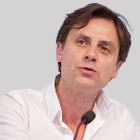
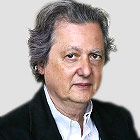
No comments:
Post a Comment